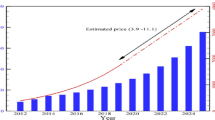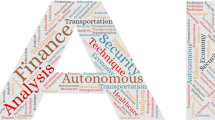Abstract
In the era of the Internet of Things (IoT), the volume of data is increasing immensely causing rapid growth in network data communication and data congestion. Computational offloading thus becomes a crucial and imperative action in terms of delay-sensitive task completion and data processing for the resource constraint end-users. Nowadays fog computing, as a complement of cloud computing, has emerged a well-known concept in terms of enhancing data processing capability as well as energy conservation in low-powered networks. In this paper, we consider a heterogeneous fog-cloud network architecture where the data processing is performed on the local or remote computing device by adopting a binary offloading policy. Based on the proposed system model, we calculate the total delay and energy consumption of data processing throughout the network and formulate a mixed-integer optimization problem to jointly optimize the offloading decision and bandwidth allocation. In order to solve such an NP-hard problem, we have proposed a deep-learning-based binary offloading strategy that employs multiple parallel deep neural networks (DNNs) to make offloading decisions. Such offloading decisions are subsequently placed in a relay memory system to train and test all DNNs. Simulation results show a near-optimal performance of the proposed offloading strategy while remarkably maintaining the quality of service by decreasing overall delay and energy consumption.







Similar content being viewed by others
References
Li Q, Zhao J, Gong Y, Zhang Q (2019) Energy-efficient computation offloading and resource allocation in fog computing for internet of everything. China Commun 16(3):32–41
Mukherjee M, Kumar S, Shojafar M, Zhang Q, Mavromoustakis CX (2019) Joint task offloading and resource allocation for delay-sensitive fog networks. IEEE International Conference on Communications (ICC), pages 1–7
Goodfellow IG, Bengio Yoshua, Courville AC (2015) Deep learning. Nature 521:436–444
Ghanavati S, Abawajy JH, Izadi D (2020) An energy aware task scheduling model using ant-mating optimization in fog computing environment. IEEE Transactions on Services Computing
Hazra A, Adhikari M, Amgoth T, Srirama SN (2020) Joint computation offloading and scheduling optimization of iot applications in fog networks. IEEE Trans Netw Sci Eng 7(4):3266–3278
Zhang G, Shen F, Liu Z, Yang Y, Wang K, Zhou M-T (2019) Femto: Fair and energy-minimized task offloading for fog-enabled iot networks. IEEE Internet Things J 6:4388–4400
Mukherjee M, Kumar V, Lloret J, Zhang Q (2020) Revenue maximization in delay-aware computation offloading among service providers with fog federation. IEEE Commun Lett 24(8):1799–1803
Guevara JC, da Fonseca NLS (2021) Task scheduling in cloud-fog computing systems. Peer-to-Peer Netw Appl 14(2):962–977
Sofla MS, Kashani MH, Mahdipour E, Mirzaee RF (2021) Towards effective offloading mechanisms in fog computing. Multim Tools Appl 81(2):1997–2042
Siqi Luo Xu, Chen Zhi Zhou, Chen Xiang, Weigang Wu (2020) Incentive-aware micro computing cluster formation for cooperative fog computing. IEEE Trans Wirel Commun 19(4):2643–2657
Nguyen DT, Le LB, Bhargava V (2021) Price-based resource allocation for edge computing: a market equilibrium approach. IEEE Trans Cloud Comput 9(1):302–317
Hazra A, Adhikari M, Amgoth T, Srirama SN (2021) Stackelberg game for service deployment of iot-enabled applications in 6g-aware fog networks. IEEE Internet of Things J 8(7):5185–5193
Xia B, Kong F, Zhou J, Tang X, Gong H (2020) A delay-tolerant data transmission scheme for internet of vehicles based on software defined cloud-fog networks. IEEE Access 8:65911–65922
Qiu Y, Zhang H, Long K (2021) Computation offloading and wireless resource management for healthcare monitoring in fog-computing-based internet of medical things. IEEE Internet of Things J 8(21):15875–15883
Beri R, Dubey MK, Gehlot A, Singh R, Abd-Elnaby M, Singh A (2021) A novel fog-computing-assisted architecture of e-healthcare system for pregnant women. The Journal of Supercomputing 1–25
Adhikari M, Srirama SN, Amgoth T (2019) Application offloading strategy for hierarchical fog environment through swarm optimization. IEEE Internet of Things J 7(5):4317–4328
Zheng H, Xiong K, Fan P, Zhong Z, Ding Z, Letaief KB (2021) Achievable computation rate in noma-based wireless-powered networks assisted by multiple fog servers. IEEE Internet of Things J 8(6):4802–4815
Farahbakhsh F, Shahidinejad A, Ghobaei-Arani M (2021) Context-aware computation offloading for mobile edge computing. Journal of Ambient Intelligence and Humanized. Computing 1–13
Lakhan A, Ahmad M, Bilal M, Jolfaei A, Mehmood RM (2021) Mobility aware blockchain enabled offloading and scheduling in vehicular fog cloud computing. IEEE Trans Intell Transp Syst 22(7):4212–4223
Najafizadeh A, Salajegheh A, Rahmani AM, Sahafi A (2022) Multi-objective task scheduling in cloud-fog computing using goal programming approach. Clust Comput 25(1):141–165
Fengxiao T, Bomin M, Zubair MdF, Jiajia L, Nei K (2020) St-delta: a novel spatial-temporal value network aided deep learning based intelligent network traffic control system. IEEE Trans Sustain Comput 5(4):568–580
Chen M, Challita U, Saad W, Yin C, Debbah M (2019) Artificial neural networks-based machine learning for wireless networks: A tutorial. IEEE Commun Surv Tutor 21(4):3039–3071
Zhang C, Patras P, Haddadi H (2019) Deep learning in mobile and wireless networking: a survey. IEEE Commun Surv Tutor 21(3):2224–2287
Abadi M, Barham P, Chen J, Chen Z, Davis A, Dean J, Devin M, Ghemawat S, Irving G, Isard M et al (2016) Tensorflow: A system for large-scale machine learning. In Symposium on Operating Systems Design and Implementation, pages 265–283
Guo H, Liu J, Lv J (2020) Toward intelligent task offloading at the edge. IEEE Netw 34(2):128–134
Funding
No funding available.
Author information
Authors and Affiliations
Contributions
The authors contributed equally to this work.
Corresponding author
Ethics declarations
Conflict of interest
The authors have no conflicts of interest to declare that are relevant to the content of this article.
Ethical approval
The manuscript is not submitted to any other journal other than this journal at this point of time.
Additional information
Publisher's Note
Springer Nature remains neutral with regard to jurisdictional claims in published maps and institutional affiliations.
Rights and permissions
About this article
Cite this article
Sarkar, I., Kumar, S. Deep learning-based energy-efficient computational offloading strategy in heterogeneous fog computing networks. J Supercomput 78, 15089–15106 (2022). https://doi.org/10.1007/s11227-022-04461-z
Accepted:
Published:
Issue Date:
DOI: https://doi.org/10.1007/s11227-022-04461-z




